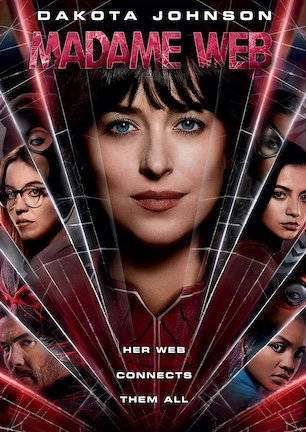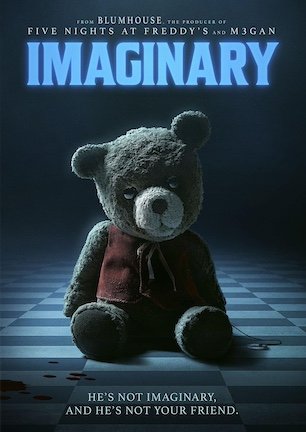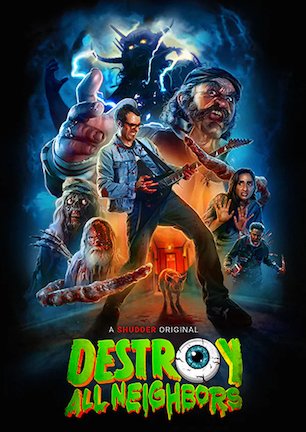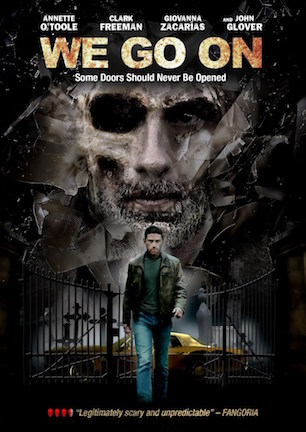Studio: IFC Midnight
Director: Nick Gillespie
Writer: Nick Gillespie
Producer: Finn Bruce, Jen Handorf
Stars: Rupert Evans, Deirdre Mullins, Steve Garry, Michael Smiley, April Pearson, Gordon Kennedy, Tom Meeten, Alex March
Review Score:
Summary:
A team of soldiers confronts nightmarish visions when they become trapped inside an abandoned tank.
Review:
Ever since a thoroughly nonplussed experience with “A Field in England” (review here), I approach Ben Wheatley projects like landmines poised to explode in a confusing cloud of impenetrable abstractness. Love it, hate it, or have only indifference, if you’re familiar with Ben Wheatley’s work, you know what I’m talking about.
“Tank 432,” which originally premiered in 2015 under the title “Belly of the Bulldog,” is only executive produced by Wheatley. But Nick Gillespie, the British filmmaker not the American journalist, has spent enough time on Wheatley sets in camera crew capacities that his style is sold as being in a similar vein. Thus, I hemmed and hawed for some time before pressing play on Gillespie’s directorial feature debut, worried of willfully walking into a 90-minute snoozer of cryptic vagaries I might not be able to decode.
Part of my hesitation came courtesy of predominantly unenthusiastic criticism that seemingly affirmed presuppositions. Four of five Rotten Tomatoes reviews use phrases including “slow-moving, confusing obscurity, unsettling ambiguity,” and more than one insertion of “tedious” to describe “Tank 432.” All of these are akin to adjectives I’ve used in conversations regarding Ben Wheatley’s films.
IMDb user reviews for “Tank 432” are less tactful in their unkindness. Over half of the scores award just one star out of ten. Choice terms include “horrible, terrible, boring, waste of time” and “makes no sense.”
Color me surprised then to discover “Tank 432” is neither as drab nor as incoherent as the above leads one to believe. Oh, the film is certainly as obtuse as I feared and as consumed with its own cinematic presentation as I expected. Gillespie is absolutely influenced by the indie artist urge to elevate showy pomp over grounded circumstance. Yet the narrative underneath can be discerned with minimal difficulty, even if metaphoric meaning disappears before its presence is ever announced. And the environmental eeriness is too engaging on a hypnotically arresting level to dismiss the film as dull.
In an unspecified battlefield amid an unknown conflict, soldiers created from the convenience of easily distinguishable characteristics, or from clichés if you’re cynical, flee from an unseen enemy with two hooded prisoners in tow. Smith is the barking CO. Gantz is the battle-hardened vet. Evans is the lanky coward. Reeves is the idealistic rookie. Karlsson is the female medic. You get the picture.
A masked man on the horizon, who may or may not be a figment of certain imaginations, draws fire from the crew. Two men are left behind and one prisoner doesn’t make it, but the team adds a disoriented woman found locked in a cargo container to their ranks along the way.
Shelter from the invisible threat is then sought in an abandoned tank nearby. But once they are inside, everyone discovers a jammed hatch means they have no hope of getting out.
Over the course of their captivity, the crew suffers from haunting nightmares, paranoid premonitions, and cabin fever that comes from confinement. Answers and explanations for what is happening and why are in short supply. Cerebral episodes of dreamy delirium however, are plentiful. And “Tank 432” fashions its back half entirely from this hearty stockpile of visualized insanity.
The movie does not develop quickly. What does develop is undoubtedly an acquired taste suited for palates tolerant of artistically alienating material.
Shots are purposeful, even if those purposes are not in plain sight. Gillespie’s career behind the camera gives him the intuition to fabricate imagery that is essential for establishing distinct feelings.
Accomplished acting then reacts to those setups in ways that allow audiences to echo a mindset of maddening tension without being required to connect to or care for any of the characters. “Tank 432” is hollow in that sense. Yet the ghostly interior is able to affect imaginations through unsettling sights, sounds, and performances.
“Tank 432” has a story, even though it isn’t delivered tangibly. It’s layered underneath atmosphere. The movie is more of an experiment in claustrophobic uncertainty intended to be consumed as a parallel experience with the people onscreen, not like the passively fed fiction of a linear book or other form of traditional entertainment. It’s an interesting film to look at it. It’s an interesting film to feel.
I’m generally a hard sell for movies that prioritize mood over meaning. A number of neophyte filmmakers finding their footing in psychological cinema thoughtlessly throw interpretive aesthetics at a wall, label it Lynchian, and assume academic applause for being a supposed visionary is incoming.
I don’t believe that is what Nick Gillespie has done here. There is much more rhyme and reason to the hallucinatory hellishness of “Tank 432” than many critics give it credit for.
Review Score: 60







If you want to see impossible amounts of blood explode crimson colors like the world’s worst version of a gender reveal, well, “Abigail” at least has that.